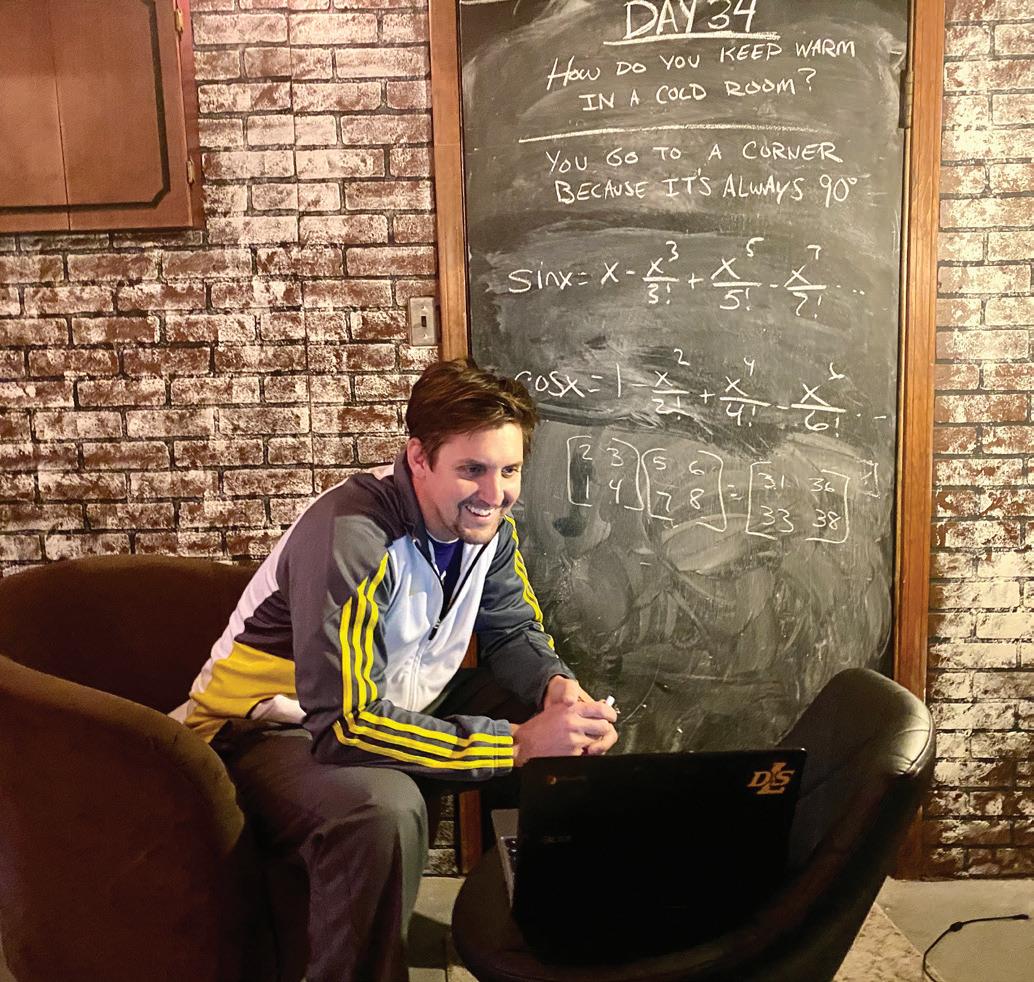
28 minute read
Distance Learning
Figuring out distance learning
When schools across the country went to distance learning last month, veteran math teacher Joe Novak was ready to help his students work through formulas with visual diagrams – the same way he does in a classroom at De La Salle Collegiate. But instead of the usual whiteboard, Novak created an oldschool blackboard to use during his online classes. “When this all happened, my wife Stacie and I were actu ally thinking we would paint one of the basement walls with chalkboard paint for our two boys,” Novak said. “Then I thought, if I paint the door to the furnace room, I can use that to duplicate the classroom experience of seeing problems worked out.” The chalkboard is in the background as Novak meets dur ing the day with his various classes from advanced algebra to Advanced Placement calculus. The chalkboard is part of regular videos Novak prepares each night for classes the next day.
Joe Novak ‘03 In addition to the chalkboard, Novak and other De La Salle teachers are working hard to keep track of attendance, by reviewing each student’s daily exit ticket and checking homework. “It’s a little tough sitting in front of a computer all day, and not moving around,” Novak said. “It’s tough for the kids, too. You can see their heads starting to droop in the afternoon.” During the school day, as he works in the basement, Novak is available during each class for students to drop into his classroom virtually. “I can’t imagine how difficult this is for the seniors,” he said. “I have about 10 seniors who come to the meeting every time, and look forward to this.” Novak is particularly working with his AP students to make sure they are prepared for AP tests. “The test has been shortened to 45 minutes,” he said. “There is no multiple choice. This will be all free-response questions.” While Novak teaches from the basement, his wife is home schooling their kindergartener Brady, and entertaining threeyear old Joey. Occasionally, the boys head downstairs to see their dad. “It’s kind of good that my students see my family,” he said. “And it gives Stacie a break for a few minutes. She’s working from home, too, although her hours have been cut back.” As math department chair, Novak also video conferences with colleagues once a week. “We regularly talk so we’re on the same page, going over what’s working and what’s not,” he said. “In school, we regularly talked with each other, so communication among us is not a big deal. Originally we thought this wouldn’t be too bad, but it is a lot of work.” Novak said that not all students are self-motivated, but a good number are looking ahead, trying to be prepared for 2020-21. “Even the smartest kids don’t prefer this,” he said. “But they appreciate what we’re doing.”
Faith leads to foster care, adoption
These are challenging times, especially for Soon afterward, the Smiths pursued pereducators trying to teach classes from home. manent adoption possibilities for Tyler. In But the opportunity to teach from home has mid-January, the family began meeting with been welcomed by Traci Smith, an English the boy, who had been with a foster mother. teacher at De La Salle Collegiate. Their time together increased over the next The veteran educator and her husband are the adoption agency determined that the spending quality time with their eight-yearSmiths and Tyler would be a good fit. old daughter, Savannah, and the newest member of their family. “It’s been a smooth transition,” Smith Tyler is a two-year-old boy in foster care mommy and daddy during the weeks before since birth. He moved in with the Smiths in he moved in with us. My husband Keith is March. “We are thrilled,” Smith said. “We have Traci Smith his first male caregiver. My husband is the best man I know, and I wanted a child who been so blessed to have loving, God-fearing would grow up to be like my husband.” parents to rear and encourage us that we wanted to do the Smith said the adoption process should be complete in same for other children.” December. Last year, the Smiths fostered three siblings, including a “We’ve been able to bond as a family for weeks now,” she child who came to them when he was three weeks old. said. “We are together all day long; we wouldn’t have been Over several months, two of the three returned to their able to do that during the school year. birth mother, while the youngest stayed with the Smiths until last January. Smith, continued on next page
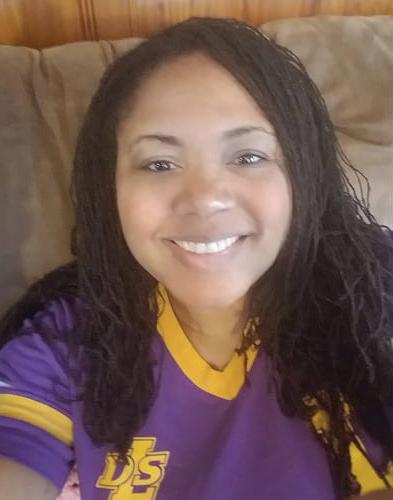
Campbell puts miles between distance learning
For De La Salle Collegiate school psychologist Andrew Campbell, distance learning is truly distant. Because of the coronavirus pandemic, Campbell and his family, including three children under the age of four, de cided to head to Campbell’s North Carolina hometown of Hickory, located between Charlotte and Asheville. Campbell notes that the coronavirus pandemic hasn’t been prevalent in North Carolina until recently. The Campbells are staying with his parents for now, in an effort to provide their children with family support and outdoor playing time, though trying to maintain a normal two months, including overnight stays, until said. “Tyler had already started calling us schedule is oftentimes difficult with three toddlers who don’t always nap at the same time. “It’s really challenging,” he said. “I have three toddlers who understandably can’t stay on task for very long. I try to do things on the computer when they are asleep, but it’s hard to get into a routine to commit a gap of time to be on the computer.” Campbell says that he has reached out to De La Salle students, along with the other counselors, making information about community resources available. He is also reaching
Campbell, continued on next page
Smith, continued from previous page
“We do this because we want to give a family to a child who needs one. God has been looking out for us even in tough times to have the time that we need with children. God has placed these children in our care. We are growing our family permanently.” Smith said that once school returns, they will slowly transition Tyler to daycare. “We have been praying for another child for seven years,” she said. “We hosted an international student at De La Salle, a boy from China, from the middle of his freshman year to his gradua tion in 2018. Then we had the three children who are still in touch with us.” While Smith relishes the time at home, she is also cognizant of the COVID-19 virus, and her family’s location in Detroit’s 48235, one of the nation’s hardest-hit zip codes by the pandemic. “It is scary living in the epicenter of Detroit,” Smith said. Smith says she finds herself waking up in the middle of the night. “I read a book to calm myself down. And pray,” she said. “Thankfully, my family and close friends are healthy. “Tyler is super energetic. But he sleeps through the night.” As for the adjustment to distance learning, Smith, who has been at De La Salle since 2013, the transition hasn’t been too tough. “We planned in advance,” said Smith, who has degrees from the University of Michigan and Harvard University. “Most of us have taught our curriculum for a while, so we know what is necessary.” While most of her English students are doing well, Smith misses the daily interaction with them. “I could look over their shoulders,” she said. “Now I’m reading journal entries, and getting a sense of how they’re doing. I re spond to each one.” As many families have found out during the pandemic, multiple family members trying to get on the internet at the same time can present problems. While Smith meets online with her classes, her husband – a Detroit Public Schools teacher – is also online teaching math and science to his fourth graders. Their daughter, a second-grader, also has school work online. “We try to balance our time,” Smith said, “so one of us is always available to supervise the children, and homeschool our daughter.”
Campbell, continued from previous page
out to students he has met with individually during the year. “I’m doing it piecemeal with my phone, instead of a block of time,” he said. Though often, that means talking with students while outside watching his own kids. Campbell has set up Google Classroom for the two groups he normally meets with on Tuesdays and Thursdays. One group is for students who struggle with organizing and staying on task. Campbell reviews their work, and works with students to create a digital day planner. The other group is for students who are less social; Campbell is reach ing out to them to share thoughts, again through Google Classroom. “Much of what I do is supportive, and reaching students via technology is challenging,” Campbell said. “But it’s what we have to work with for now, and I’m committed to making this work.” While a member of the counseling department and the school psychologist, he also works with the International Baccalaureate Program, organiz ing the groups annual learning and service trips to Montana and New Orleans, as well as coordinating local service projects in the Detroit area. Campbell, who earned his bachelor’s in psy chology and biology at Clemson University, headed to Michigan a few years ago. He met his wife shortly after moving to Michigan He earned his psychology specialist degree at the University of Detroit Mercy, and joined the De La Salle staff in October 2018, shortly after com pleting his degree. Andrew Campbell
Vidican is no stranger to adaptation
With the school building closed and teaching moved from the classroom to virtual reality, De La Salle Collegiate teachers and students are learning to use technologies in a whole new way. Foreign language teacher Adriana Vidican is no stranger to adaptation – or wearing a mask, which is the new normal during this coronavirus pandemic sweeping the world. Trained as a teacher in Romania, she and her husband John fled to the United States in 1992, seeking politi cal asylum. “We were living in fear,” Vidican said. “You didn’t know if your school colleagues were informants to the dictatorship’s secret service. I had to be careful when talking to students because they were prodded at home to tell what they heard from teachers. You had to wear a ‘mask’ in public to hide what you really felt about the oppressive regime. The only wish you had was to survive and to protect your family. You could not trust anyone, not even your friends. There were horrible feelings of mistrust and fear.” She said the decision to flee came down to life or death. “We believed our lives were in danger,” Vidican said. When the couple escaped, their daughters, then ages 13 and 6, stayed behind with Vidican’s parents. “Only my father knew we were leaving,” she said. They kept in touch with letters in those pre-tech nology days. John Vidican, an engineer, found employment right away. But for Adriana, the job market was much harder. While working on certification for teaching, she worked service jobs in restaurants, on a factory assembly line, and did data entry at a business. In 1997, the family was reunited in America. The Vidicans had not seen their children for five years.

Each summer Vidican enjoys returning to Europe to spend time with her mom, who still lives in Romania’s Transylvanian region. Vidican became a long-term substitute in Warren public schools in the late 1990s and joined De La Salle’s staff in Adriana Vidican 2001. “I love teaching,” Vidican said. “When I started in 2001, I didn’t think I’d stay more than a year. I wasn’t sure if I could connect. But I am in love with the school.” Now, distance learning has Vidican working with two comput ers each school day. She uses one for messages from students, and the other for lesson plans, classwork, and homework. “In class, I gave directions verbally, and checked homework informally,” she said. “Now I can highlight, make suggestions, and make all kinds of notes.” Since speaking is integral to foreign language teaching, she is also listening to student recordings, as well as checking homework. Vidican said that the textbook does have an online program with videos. “I am doing more than I would in class,” she said, “but the videos help students hear the correct pronunciation.” She is also adding videos of herself to the teaching menu. “I tried it with a colleague, and now I have more confidence,” she said. “Gradually, I’m getting there. It is a lot of work to prepare.” During the pandemic, John Vidican is also working from home. She worries about their daughters, both in the healthcare indus try. One is a dentist, and the other a pharmacist. “She was working at a pharmacy, and they had no masks,” Vidican said. “It is scary.”
Couples are up for the challenge
While De La Salle Collegiate teachers have transitioned from in-person classrooms to distance-learning environ ments, the Slussers and VanThommes are adjusting to other COVID-19 pandemic challenges. The Slussers and VanThommes, who teach theology and science, respectively, have experienced their own set of issues while adjusting to online learning, at the all-boys’ Lasallian Catholic high school. Dave and Shelley Slusser had their daily routines upended when a pipe burst in their kitchen in mid-March. Water caused significant damage to the floor as well as the laundry room in the basement. The kitchen floor has been removed. But the Slussers, along with their two children, are washing dishes in the bathroom. “It’s been a challenge,” Dave said. For the time being, the Slussers are sharing their online classroom space with kitchen appliances in the dining room. The damage is covered under homeowners’ insurance, which is also providing a laundry service that comes once each week. Luckily, no such catastro phes for Jackie and Tom VanThomme. They’re just happy to find enough time in the day to get through their classes and lesson plans while trying to entertain daughters, Sarah, 6, and Madison, 2. The VanThommes take turns on the computer, trading off throughout the day with most of their class planning taking place late in the evening and into the early morning hours when the girls are sleeping. The transition has been relatively smooth, Jackie said, with one exception: when she ran out of loose-leaf paper. She’s now writing math notes on large stickers to display to students during video calls. “Sometimes the kids get freaked out about the math,” Jackie said, out her students. But for the most part, distance learning has been seamless, continued on next page

Shelley and Dave Slusser teaching at home
continued from previous page though the VanThommes miss seeing their students in the classrooms and hallways. “I miss greeting the kids as they walk into school,” Tom said. “I miss those interactions, seeing what kind of day they are having. It’s difficult to understand emotion and feeling in emails.” Jackie added, “I miss (the students) asking questions that eventually get to another aspect of science. Right now it is more structured. I like to see them reach these conclusions without leading them there.” Jackie said she particularly missed hosting her annual March Mammal Madness, a virtual battle between organisms in a tournament-like bracket. “We never got to continue,” she said. “We have 200 kids between the two of us, and we are trying to think of a way to incorporate it.” The Slussers said they also miss their students. “I’m sad. I teach a lot of seniors, and I won’t have a chance to say goodbye,” said Dave, a De La Salle alumnus, who graduated in 1993. “This has been really hard, and I can’t imagine how tough it must be for them.” Shelly added, “sometimes it’s difficult to get a good picture (of the students) on Google Meets. I use Snapchat a lot. I get to see the students. They are more relaxed with the one on one.” Connectivity presents another set of potential problems for families like the Slussers, who are oftentimes on the Internet. They are learning firsthand how demands on bandwidth can cause issues for two working teachers and their school-aged children. Son Michael, a freshman at De La Salle, and daughter Angelina, a sixth-grader at Our Lady Star of the Sea in Grosse Pointe Woods, are online throughout the day, too. “Michael is usually up early, and gets his work done by 10 a.m.,” Shelley said. “He doesn’t like it hanging over his head. We don’t need to remind him or pressure him. He loves De La Salle.” Jackie VanThomme chairs the Science Department and is now conducting regular video conferences online with her colleagues. She’s also an International Baccalaureate teacher and involved in scheduling those online meets at least three times a week. The VanThommes note that teaching biology and chem istry presents unique challenges for teachers trying to cover a curriculum virtually. But both are also learning different ways of teaching and may incorporate more of the flipped-classroom concept when schools return to inperson instruction. Like other IB teachers, Jackie is working with her IB seniors on their cumulative assessments, essentially a project. “All IB tests have been canceled for the 2020 seniors,” she said, “so the assessments are really important.” The change in routine has also allowed the VanThommes to spend valuable time with their girls. Sarah, the oldest, recently learned to ride a bicycle without training wheels and is adapting well to her online school work. “She enjoys learning on ABC Mouse which was opened to school districts for free,” Jackie said. “They earn tick ets playing games, and can earn a virtual pet, just like at Chuckie Cheese.” The Slussers are trying to stick to a routine. Eating break fast together in the morning, working online during more traditional school hours, and reaching out and answering emails until 8 p.m. Dave and Shelley work at the same table together all day, with the noise of construction tools a few feet away, and constant dust. “We remind each other to take attendance, to call students,” Shelly said, “but also to take a break.”
IB students face different online challenges
During the COVID-19 pandemic, while all of De La Salle Collegiate’s classes are being taught online, juniors and seniors in the International Baccalaureate Program have a unique challenge. Eric Wynn is De La Salle’s director of the worldwide education program. He says that all of the IB tests, tra ditionally given in May, are canceled for this academic year. “What’s important is that students do really well on their course work,” Wynn said. “That is what will count for their certificate and IB diploma.” Wynn regularly video conferences with the entire IB team at least twice a week, and they agree on due dates. “We don’t want to overload the calendar, and burn out the kids,” he said. Wynn is excited about how the course work is go ing and is pleased that most students have completed the CAS portion of the curriculum (Creativity, Activity, and Service), the purview of school psychologist Andrew Campbell. “Just because there is social distancing, students can still engage in individual creativity and service,” said Wynn, who is in his first year at De La Salle. “Students are try ing new things. One student is doing a video diary of his quarantine. They can engage in service by raising aware ness, such as creating a FAQ (frequently asked questions) for something like National Autism Day and sharing with their class.” Wynn also sits in various virtual classrooms throughout the day and encourages teachers to be physically present. “It’s more interactive and personable,” he said. “Kids want to see their teacher’s face and hear their voice. It’s been a smooth transition. We’re lucky to have all this technology.” Recently, foreign language teachers Adriana Vidican and Katarzyna Griffith have begun oral assessments in their French and Spanish classes.
Eric Wynn
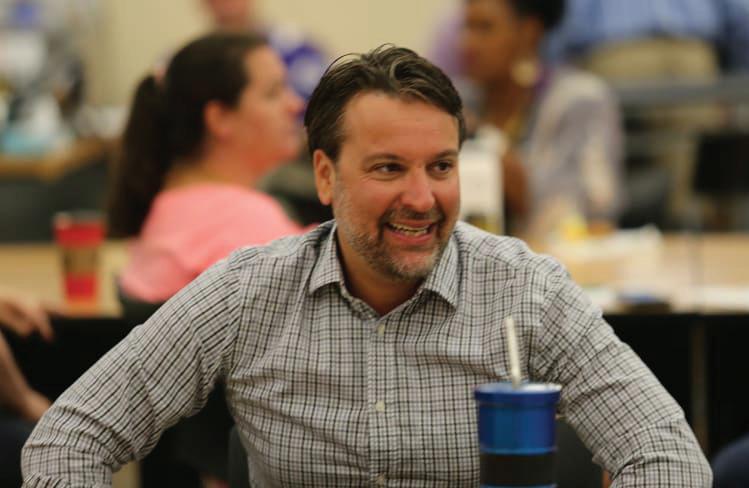
“This is nerve-wracking in normal times,” Wynn said. “Teachers work with students one-on-one. They begin with the student showing the teacher the room, and ensuring no dictionaries or posters are present, no phone opened to a translation app. The teachers literally hold a visual stimulus up to the screen. The student then has to describe the im age in the target language, followed by a 15-minute conversation. It is challenging, but we’ve managed to transplant the environment.” Wynn notes that the two math teachers, Catherine Leix and Shaun Legato, are using school cameras to enhance their math teaching. “They can write on a piece of paper, under the camera,” he said, “which is connected to the computer and the video conference.” Most of the students had completed lab work in science classes before the mid-March shutdown, and are now working on self-directed labs. “They are tasked with coming up with an issue in chemis IB Students, continued on next page
IB Students, continued from previous page try or biology,” Wynn said. “They have to attempt to solve using their own hypothesis. There is some amazing critical thinking at work.” Wynn also cites the book circles in the IB English classes of Annmarie Michol and Jenna Page. “They are having lively discussions about the assigned reading, at 8:30 in the morn ing,” he said. “I am really excited about that.” For the May assessments, essentially a long-term project, it’s just not viable to do traditional testing. “We have to find out what they know and how they know it, without a paper and pencil test,” Wynn said. “Teachers are coming up with creative ways to assess, such as having students present a video to explain a chemical reaction or biological process.” Another area of the IB curriculum is Art that traditionally students have an exhibition on risers, and make it look professional. “Now, students will have to stage an exhi bition at home, and photograph the whole thing and send it to the art teacher,” Wynn said. With school coming to a close next month, Wynn is looking at ways to send off the senior class with a virtual celebration. “We want to recognize their hard work,” he said. “IB students have chosen a challenging road, and gone above and beyond this year.”
Teacher offers student workouts
\Veteran physical education teacher Scott Grimmer hopes students will spend some time each day with his WOW – With Out Weights workout. When the spread of COVID-19 closed schools across the country, and De La Salle Collegiate went to distance learning, some parents approached Christopher Dean, assistant principal for academics, ask ing for something for the kids to do at home. Dean spoke with Grimmer, who quickly created the program. Grimmer put the 35-40 minute full-body workout together with the assumption that most students have no strength-training equipment available. The workout is explained on the De La Salle website’s Distance Learning page. “As is typical, Scott approached this initiative with enthusiasm and a can-do attitude to provide another layer to our distance-learning plans,” Dean said. “Scott, and many of our teachers, are just incred ible examples of why De La Salle stands out as an innovative and creative learning environment while continuing to maintain and grow student engagement.” Grimmer says the workout includes a cardiovascular component, with no breaks between sets, depending on the individual, or some rest/pause when necessary. The workout includes a five-minute warmup that can be used on a treadmill or stationary bike, or a short jog. He also provided suggested repetitions for each of the 11 activities. “Anything to get your heart rate elevated and moving,” he said. “I tried this myself, and it took about eight minutes.” For a 30-40 minute workout, including warm-up and cool down, students can repeat the cycle of activities three times. Grimmer and his four health classes usually spent about 75 percent of their time in the weight room, and the rest in the classroom, using the online program Dynamic Health. “It’s not the same as resistance training with weights,” he said, “but it may be the best you can do right now to keep fit.”
NASA inspires art assignment
Art teacher John Hicks regularly spends class time workstudents don’t have their tools with them. ing with individual students, giving in-person critiques of “Art I students were about to start painting,” Hicks said. works in progress, and inviting peer comments. “They were all excited, and now it seems like they’re re That same approach continues during the current gressed. So we are back to pen and paper, and I’m teaching COVID-19 pandemic that now has students distance learn them new techniques.” ing at De La Salle Collegiate. For Computer Graphics students, without access to Adobe Hicks has been posting assignments and video tutorials, Photoshop and Illustrator on school computers, Hicks is and is available to answer questions during the day for creating assignments using Adobe Spark, a simple online his students in computer graphics, studio art, portfolio program that can create a variety of graphics, webpages, art, video production, and and even videos. International Baccalaureate For advanced art students, Hicks art. said, “It’s business as usual.” Recently, he added an assignHe is working with his IB ment requiring most of his students who are preparing art students to design and create a exhibits in their homes, and then personal protective equipment, sending photographs. using NASA’s in-situ resource utilization. During the pandemic, Hicks is “Think of the movie Apollo daughter and two-year-old son. 13, when an oxygen tank His wife Jessy runs her family’s explodes, and the crew has to grocery store in Sterling Heights. figure out what to do, us Pre-pandemic, Jessy would have ing what they have on hand,” taken the children to her parents’ Hicks said. home during the day. The assignment included “I’m really proud of her for instructions to make an inven working so hard, 10 to 12 hours tory of what could be used, a day, to keep people fed and such as plastic or glass, as happy,” Hicks said. “She really well as fabric, and what items takes her work seriously, espe could be used to attach pieces, cially now as people try to shop such as staples or tape. Then small and avoid the big grocery students had to create a sketch stores. or drawing, and send in their “Mr. Mom” to his three-year-old photos. “This has been tough for ev eryone. But I’ve gotten to know Hicks is also adjusting his my neighbor better. Instead of a classwork, recognizing that his quick hello, I find myself having Art 1 and computer graphics Andrew Fergan tests his NA SA design 20-minute conversations.”
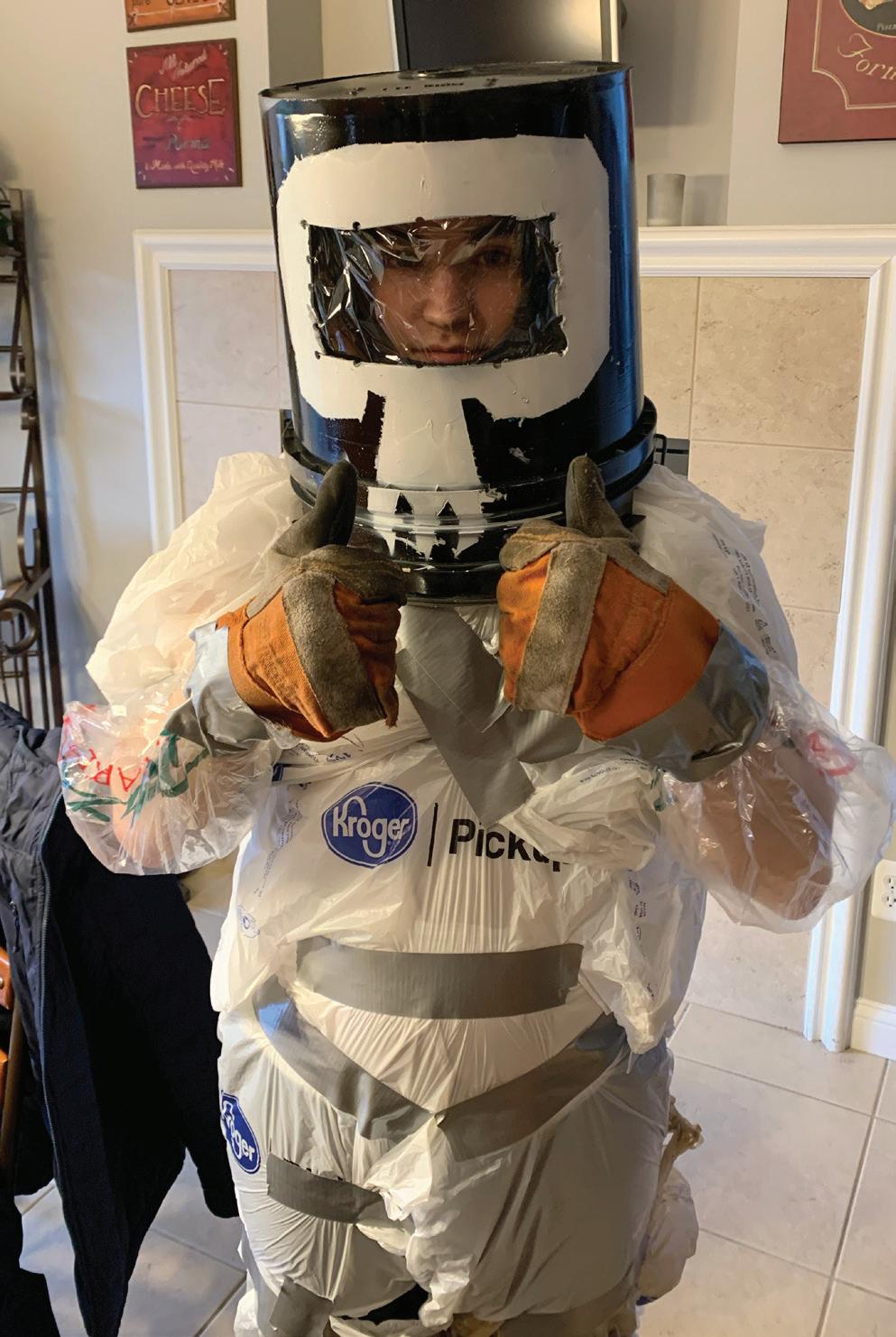
Nielsen keeps busy through quarantine
Junior Austin Nielsen played Senator Max Evergreen in the recent De La Salle Collegiate stage production of “Nice Work If You Can Get It.” Before the COVID-19 pandemic closed schools, he was ready to appear in Regina High School’s March produc tion of “The 25th Annual Putnam County Spelling Bee,” a musical comedy. He was to play Leaf Coneybear, a boy home-schooled by hippie parents. “I practice my lines when I have a chance,” Nielsen said in a Zoom call last week. “Leaf is a young kid who re ally doesn’t belong at the spelling bee and only got there because the winners of the previous spelling bee couldn’t make it. He has severe (attention deficit disorder) and is a really fun and goofy character whose hobby is making his own clothes.” Academically, Nielsen is enrolled in De La Salle’s pres tigious International Baccalaureate classes, and praises
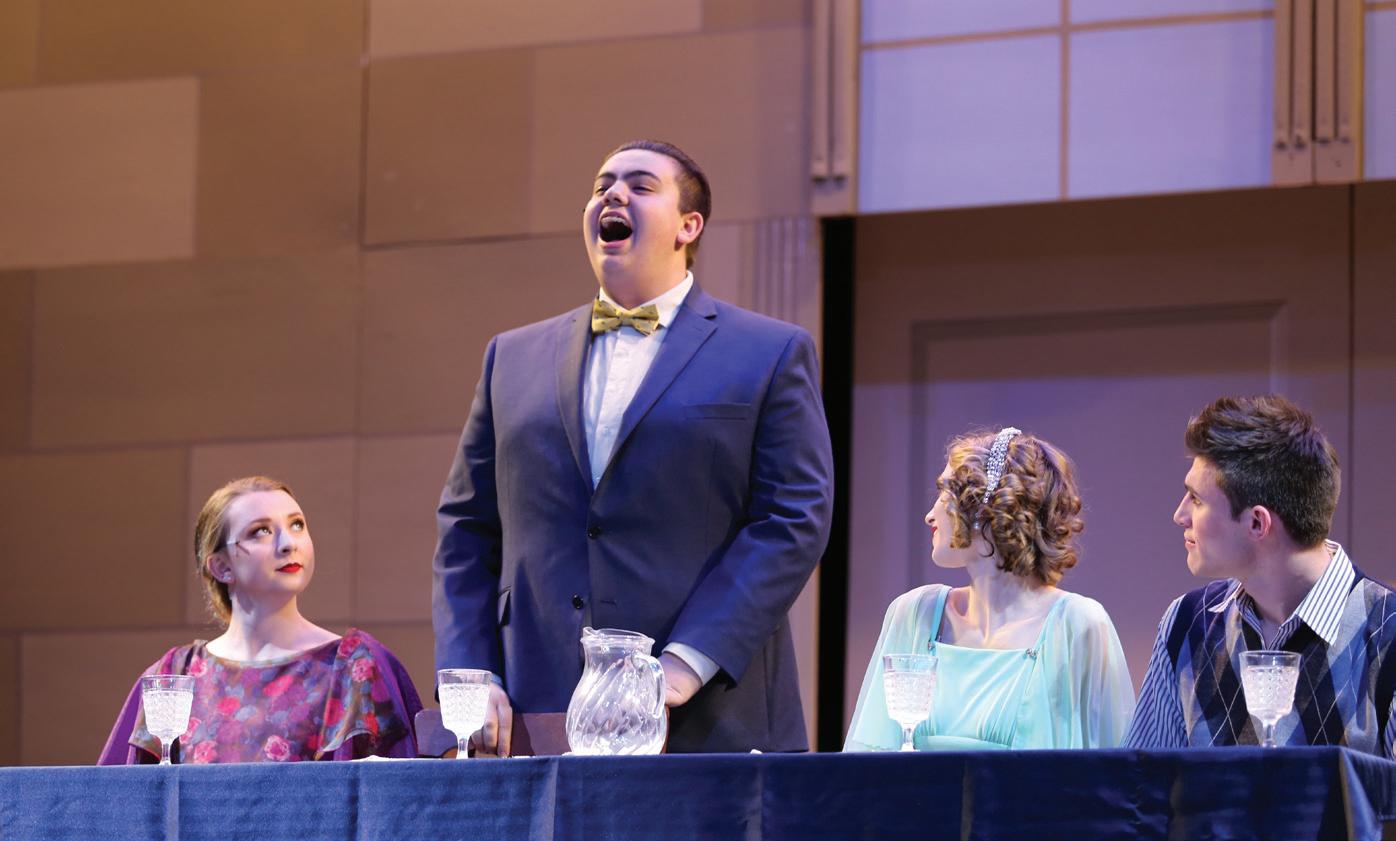
Austin Nielsen plays Sen. Evergreen his teachers who, as he says, “are in sync and know who is doing what and when.” He is used to submitting homework during class, but now uploads assignments to his folder in Google Classroom. Currently, Nielsen is taking IB courses in literature, biol ogy, the theory of knowledge, Spanish, history, business, and math. His math teacher, Catherine Leix, provides video explana tions of complex problems. Nielsen does the homework in a notebook, and then scans the work and converts the docu ments before submitting it. Nielsen explained that his teachers have assigned times for Google Meets, a video conferencing application, and thus far, no two classes are meeting concurrently. “There has definitely been a distance-learning curve,” he said. “But, if we are confused, teachers are right there in Google Classroom and can add a comment.” Nielsen and his brother Nicholas, a freshman, have devel oped a routine of waking by 10 a.m., and working until 3-4 p.m. Both boys attended St. Germaine Grade School in Saint Clair Shores. “I have projects to work on for IB, and I go back to that task after dinner,” Nielsen said. He is working on a Spanish video, as well as a math project video. “I think the faculty, staff, and students are doing an amazing job during this ex tremely odd experience,” Nielsen said. “I feel this has made everyone figure out that things do happen, and we have to be able to come together.”
Brothers adapt to new order
Joe and Jon Opolski
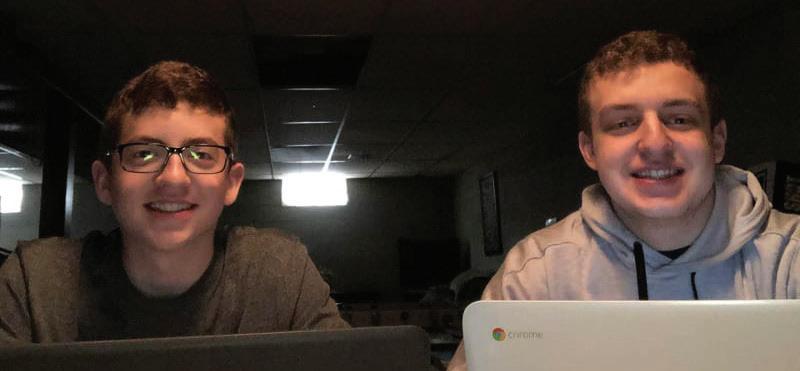
Until the coronavirus pandemic closed schools statewide, and De La Salle Collegiate students began distance learning in mid-March, brothers Joe and Jon Opolski normally studied in their own rooms. But the advent of distance learning has changed that. In the midst of social distancing, the two are working at the same table in the family basement, each with his own computer. “It’s nice to have another person around,” said Joe, a senior. “It keeps you focused.” The two have established a routine during the stay-athome orders imposed by Michigan’s Governor Gretchen Whitmer during the coronavirus pandemic. They wake up by 9 a.m., and begin checking their respec tive Google Classroom accounts for assignments. Both say their work takes approximately three hours to complete, including the time to upload assignments via PDF or photo to their accounts. Each day, teachers have established times for classes to meet for instruction and questions in Google Meet, and the Opolskis say most of their classmates are there. “I’d rather be in school,” said Jon, a freshman. “But you have to adapt to the circumstances. So far, it’s going really well for me.” Both boys praise their teachers. “Teachers have adapted,” Joe said. “Students are keeping up with schoolwork and learning from home. The teach ers are doing a good job of giving help, adding videos, and tailoring lessons to the individual person.” He says that he often calls friends while working on home work, and the conversations help make things feel normal. The boys both say that it can feel cramped at home at times. A younger brother in the seventh grade at Immaculate Conception, in Ira Township, is also distance learning. Mrs. Opolski is online doing paperwork for her job at a hospital. Mr. Opolski works at an auto dealer, and is the only family member not at a computer each day.
Olejniczak sticks to a routine
What is the scientific suffix for every enzyme? De La Salle Collegiate junior Ed Olejniczak knows. The answer was required as he finished a lesson on en zymes and proteins for his International Baccalaureate biology class for teacher Jackie VanThomme. The global coronavirus pandemic has created a new world of distance learning, and teachers are using questions like this to ensure students are completing assignments. The questions are called exit tickets. “We don’t submit all assignments to Google Classroom,” Olejniczak said. “The only way the teacher knows you are there is with that question.” For Olejniczak, who carries a 4.2 grade-point average, his day at home is similar to a regular school day. He and his younger brother, Joe, an eighth-grader at Our Lady Star of the Sea in Grosse Pointe Woods, are stick ing to a routine each day, waking up by 9 a.m., and eating lunch at a normal time. The brothers work on computers in a common area, or at the dining room table. As much as possible, Olejniczak tries to complete work by 2-2:30 p.m. The exit tickets are due each day by 3 p.m. “Biology and Spanish are at a higher level, and that’s been pretty intense,” Olejniczak said. “But it evens out.” His other IB classes include English, math, business, and history. With De La Salle’s Purple and Gold Days schedule -- three 80-minute classes one day, and four the next -- students are able to concentrate on just three or four classes on any given day. Many of their high school counterparts, also in distance-learning situations, are trying to meet the de mands of seven classes each day. While Olejniczak would prefer to be in school and misses the interaction with his classmates, he thinks the transition has been pretty smooth, with the amount of work similar to what he would have during an in-person school day.
Ed Olejniczak
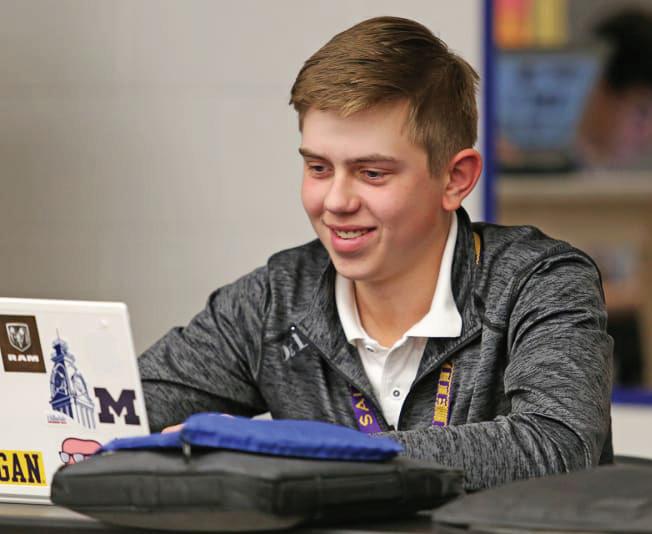
“It’s been good learning on your own at your own pace with the support of teachers and classmates,” Olejniczak said. During the day, he tries to get outside and hit golf balls in the backyard. He is a member of the school’s golf team, and that season, like all spring sports in Michigan, were canceled during the pandemic. In addition to keeping up his golf game, Olejniczak and his brother have kept busy playing some basketball, playing with the dog, and working on puzzles. Olejniczak also was on the bowling team, serves as a stu dent ambassador, and is active in both the school’s student environmental group and the sportsmen’s club. Olejniczak parents, Edmond and Linda, are both working from home; Edmond is a De La Salle alumnus from 1991. “We’re making it work,” Olejniczak said. What is the scientific suffix for every enzyme? It’s -ase.






